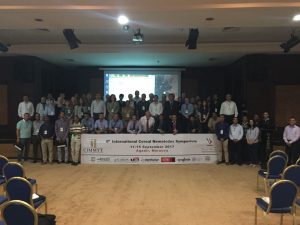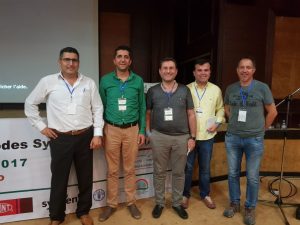
AGADIR, Morocco (CIMMYT) – Eighty delegates from across the globe recently gathered at the 6th International Cereal Nematode Symposium in Agadir, Morocco to discuss the spread of nematodes, what strategies can be used to lessen their impact on crops and boost international collaboration on research.
Plant–parasitic nematodes pose an enormous threat to global food security, destroying about 15 percent of global food production annually, a loss of more than $157 billion worldwide.
“Nematodes are the unseen enemy of our crops,” said Ricard Sikora, a professor at the University of Bonn in Germany who spoke at the symposium. “[They] attack the root of the crop…they are little worms that most people don’t even know exist, but they are having a devastating effect on our ability to feed ourselves properly now and in the future.”
During the opening speech of the symposium, which was held from September 11-16, the Director of Morocco’s National Institute for Agricultural Research’s (INRA) regional center in Agadir Abdelaziz Mimouni gave a general presentation about the different centers of INRA-Morocco as well as its research programs on cereals.

Fatih Ozdemir, director of the Bahri Dağdaş International Agricultural Research Institute and coordinator for the International Winter Wheat Improvement Program in Turkey, spoke about the importance of the soil borne diseases in Turkey and the region. Tadesse Wuletaw, wheat breeder at the International Center for Agricultural Research in Dry Areas (ICARDA), welcomed participants and spoke about the role of breeding programs to control diseases.
“We have so many common problems in each of our nations,” said Richard Smiley, a professor from Oregon State University who presented on cereal nematodes in the Pacific Northwest. “Our goal is to understand and describe the biology of those nematodes, but also to determine how they can best be managed economically by our farmers.”
Abdelfattah Dababat, leader of the International Maize and Wheat Improvement Center’s (CIMMYT) Soil Borne Pathogens Program, thanked CIMMYT and donors for supporting the Symposium as well as INRA for hosting this symposium. The conference was coordinated and organized by Dababat as part of the ICARDA-CIMMYT Wheat Improvement Program (ICWIP), and funded by CIMMYT, INRA, DuPont, Bisab, Labomine, Agrifuture, GRDC and Syngenta.
The 7th International Cereal Nematode Symposium will be held in India in 2019. For more information, please contact Abdelfattah A. Dababat at a.dababat@cgiar.org or the local organizer for the 7th Symposium in India Umarao at umanema@gmail.com.
Watch a video summary of the 6th International Cereal Nematode Symposium in Agadir, Morocco below:
 Nutrition, health and food security
Nutrition, health and food security 
